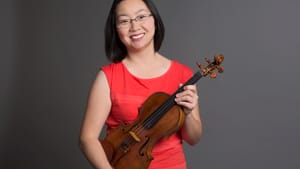Stay in the Loop
BSR publishes on a weekly schedule, with an email newsletter every Wednesday and Thursday morning. There’s no paywall, and subscribing is always free.
Yannick's bonny band goes to Scotland
Philadelphia Orchestra presents 'British Isles Festival, Week Two' (first review)

Scotland proved fertile ground for exploration in the second week of the Philadelphia Orchestra’s British Isles Festival. With program selections spanning more than a century, Yannick Nézet-Séguin and the Philadelphians deftly captured the country’s wild and wonderful temperament through music.
Of course, none of the three composers on the bill were actually Scottish. Sir Peter Maxwell Davies comes closest; the Lancashire-born composer and conductor fell in love with the remote Orkney Islands in the 1970s and lived there until his death in 2016. Local nuptial customs provided the inspiration for his 1985 tone poem An Orkney Wedding, with Sunrise, which received its area premiere in this series.
The composition flirts with tradition, as echoes of program-mate Mendelssohn’s wedding march can be heard throughout. But Maxwell Davies quickly subverts expectations in ways that show the listener not just the majesty of the Scottish landscape, but the spirited nature of the country’s people.
Marriage on the rocks
The fortissimo clamor of violins and brass that opens the piece suggests a volatile terrain where, as program notes inform us, “the rain comes horizontally.” That tumult suddenly gives way to gentle extended passages for oboe, clarinet, and flute. The contrast produces a sense of relief: the guests have escaped the island’s wild weather and are ready to celebrate this sacred rite.
Whenever Maxwell Davies conducted An Orkney Wedding, he often had a glass of whiskey delivered to the podium around the halfway point. It signified the reception’s raucous mood, replete with country dancing and free-flowing spirits.
Nézet-Séguin refrained from imbibing during the concert, but he still created an appropriately lively mood, leading spritely passages of barn dancing, folk song, and a genuine hoedown. Despite the musical hurly-burly, the intonation never turned shaggy; perhaps that was a benefit of remaining sober.
An Orkney Wedding closes with bagpipes, which represent the rising sun that greets the all-night revelers heading home. On January 18, 2018, Timothy Linahan of the Philadelphia Police & Fire Pipes and Drums took soloist duties, entering from the rear of the parquet in full Scottish regalia.

If the moment felt gimmicky, it was also in keeping with the composition’s ebullient tone. In 15 freewheeling minutes, the orchestra showed how adeptly Maxwell Davies rendered the spirit of his adopted home.
Fancy folk
The remainder of the program highlighted Scotland in more traditional ways, but Nézet-Séguin made the familiar selections sound fresh and vibrant. Bruch’s Scottish Fantasy, Op. 46, showed off the considerable talents of first associate concertmaster Juliette Kang, who played the violin solo.
Kang particularly impressed in her reading of the Andante sostenuto, proving that a folk tune can sound as refined as anything composed by Beethoven or Mozart. Elizabeth Hainen brought a light and airy tone to the concerto’s extended harp writing, and Nézet-Séguin kept a sprightly pace across the four unbroken movements.
After a well-earned standing ovation, Kang favored the audience with Hindemith’s Sonata for Violin Solo, Op. 31, No. 2 (“Es ist so schönes Wetter draußen”) as an encore.
Mendelssohn’s Symphony No. 3 in A Minor, Op. 56 — the “Scottish” symphony, as it’s colloquially known — occupied the entire second half of the program. Nézet-Séguin conducted freehand and from memory, and I keenly felt his connection to the music. At times, he didn’t so much lead the orchestra as sway with it. Still, one sensed control across the long composition, which built in color and texture to a stirring finale.
The concert was also notable for its cohesiveness — although the three works were played in reverse order, from newest to oldest, they deftly communicated Scotland’s musical heritage. At a time when orchestral programming often feels frustratingly piecemeal, I cannot overstate the pleasure of encountering a unified musical idea.
To read Linda Holt's review, click here.
What, When, Where
British Isles Festival, Week 2: Bruch and Mendelssohn. Yannick Nézet-Séguin, conductor; Juliette Kang, violin; Timothy Linahan, Gary Hughes, and Mark O'Donnell, bagpipes. Sir Peter Maxwell Davies, An Orkney Wedding, with Sunrise; Max Bruch, Scottish Fantasy, Op. 46; Felix Mendelssohn, Symphony No. 3 in A Minor, Op. 56 (“Scottish”). Philadelphia Orchestra. January 18-20, 2018, at the Kimmel Center’s Verizon Hall, 300 S. Broad Street, Philadelphia. (215) 893-1999 or philorch.org.
Sign up for our newsletter
All of the week's new articles, all in one place. Sign up for the free weekly BSR newsletters, and don't miss a conversation.

 Cameron Kelsall
Cameron Kelsall